#mrs. proust
Text
"Sooner or later, it's all about the soul."
Terry Pratchett, I Shall Wear Midnight
#mrs. proust#tiffany aching#i shall wear midnight#discworld#terry pratchett#truth#wisdom#people#human nature#inevitable#soul#sooner or later#it's all about the soul
238 notes
·
View notes
Text
The two of them were linked in some mysterious storybook way.
Marcel Proust, Swann's Way (1913)
#on a scale of 1 to andre gide turning down in search of lost time how badly did you fuck up today 🙃#truly the literary equivalent of 'guitar groups are on the way out mr. epstein'#in search of lost time#swann's way#marcel proust#literature
709 notes
·
View notes
Text
‘The best disguise for a witch is a rather cheap witch’s outfit! Would a real witch buy clothes from a shop that also does a pretty good trade in naughty Fido jokes, indoor fireworks, laughable pantomime wigs and – our best and most profitable line – giant inflatable pink willies, suitable for hen nights? That would be unthinkable! It’s boffo, my dear, pure, unadulterated boffo! Disguise, subterfuge and misdirection are our watchwords.’
-- Terry Pratchett - I Shall Wear Midnight
#Terry Pratchett#discworld quotes#GNU Terry Pratchett#quotes#I Shall Wear Midnight#Tiffany Aching#Mrs Proust#Eunice Proust#witches#boffo#disguise#subterfuge#misdirection
66 notes
·
View notes
Text
I love you in every timeline - Prologue: In Search of Lost Time
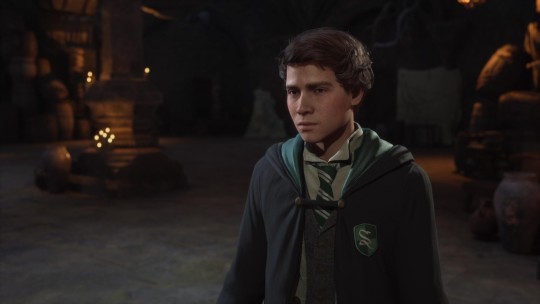
Pairing: Sebastian Sallow x Fem!Reader
Words: 1.9k
Chapter Warnings: angst if you squint, Harry Potter characters appearance, no name appearance (not even y/n dw), some swearing, use of 2nd person for the reader (I know I know but I promise it makes sense for the story)
Summary: "He turned around, and the world seemed to stop around him. She had followed him: into another timeline, into another universe.". In which Sebastian, in his search for a cure in the Dark Arts, finds himself 100 years into the future and meets his most trusted companion's descendant (who looks far too similar to the girl he was once secretly in love with).
A/N: this is the first english fic I've written, so I'm terrified. Anyway, Trimetravel! AU with Sebastian Sallow. Some background info: Reader is not MC; Reader is a Gryffindor, MC was a Slytherin; MC was a Pureblood, Reader is a Muggle Born. Also, english is not my first language so if you find any mistakes, I deeply apologise. Not proof-read (for obvious reasons).
→ Find the rest of the fanfiction here on AO3 :)
"For we are not as faithful to the being we have most loved as we are to ourselves and sooner or later we forget her — since that is one of our characteristics — so as to start loving another." - Marcel Proust, In Search of Lost Time
If a chasm had opened under Sebastian's feet and swallowed him all the way to the depths of hell, he would have gladly accepted his demise there and then.
Unfortunately, its mercy seemed to be out of business that day — or any other day in his life, really.
Sebastian paced the corridors, a frown adorning his face; he had just come out of the Headmaster's office due to the absolute disaster that had occurred to him just a few hours prior.
After weeks of research, he had finally found something that could help him, a breakthrough with which he could finally achieve his goal. An artefact so powerful that it could break the fabric of time and space, something that could help his poor sister live a happy and healthy life again. He did not care that they were not on speaking terms at the moment: he would find a way to talk to her so that she would take this last chance. He would force her if he had to. It was his last hope, and Merlin knows he had tried everything.
If he had known about the artefact's effects earlier, he would have thought twice before using it.
"So, Mr Sallow, could you be so kind as to tell us how you came to be in our time?" the Headmaster, who had earlier introduced himself as Albus Dumbledore, had asked him.
Truth was that not having stopped dwelling with the Dark Arts in search of a cure for Anne had led him to find himself in another timeline instead. His face twitched: in terms of unlikelihood, the scales seemed pretty unbalanced.
It had been a brief conversation, really, with Sebastian omitting some details (like his friendship with an Ancient Magic wielder or the murder of his uncle, for which he bore full responsibility) and grimacing against his own will when the Headmaster had looked at him through his half-moon shaped glasses as if asking him, 'Why are you lying to me?'
He had pushed the thoughts away as quickly as they had come: it wasn't like he could read his mind... or could he?
Sebastian breathed a sigh of relief when the Headmaster had dismissed him after giving him specific instructions on how to behave until they found a way to return him to his timeline — one of which was, "Please don't inform anyone of your condition unless it's absolutely necessary." That had seemed quite reasonable to him, so he nodded.
The artefact was damaged, as expected, and unlikely to work again unless a powerful form of magic came into contact with it and repaired it: something like Ancient Magic, perhaps, or a miracle.
"I see you're still causing trouble everywhere you fare, aren't you, Mr Sallow?" the familiar voice of Phineas Nigellus Black had mocked from his portrait, effectively startling him. Sebastian had looked up and into the eyes of his old Headmaster, his mouth falling open at the sight of him. He looked old, weary, and angrier somehow — yet, in a way, he had brought Sebastian some form of comfort, almost. A sense of familiarity.
Before he could have said anything, Black had disappeared, and a woman with severe blue eyes and long robes had escorted him out of the office.
-
Sebastian looked around at his familiar surroundings, which would have been almost comforting if not for the nameless faces looking at him with curiosity: Hogwarts students tended to recognise each other effortlessly, and anyone who didn't fit into that bundle of familiarity was to be ostracised. He remembered all too well when he was the one helping the new fifth-year find her way around those same corridors, except he didn't need guidance: this was his home, after all.
But he did have a guide, and she wasn't as charming a student as he was either.
The Head of the Gryffindor House walked right next to him, a stern expression on her face made even more prominent by the shadow of her large witch hat. The woman Sebastian had come to know as Minerva McGonagall was also the Transfiguration teacher and Deputy Headmistress, at least it seemed that way, which was no doubt why she was accompanying him rather than the Head of his own House.
Sebastian decided not to ask himself any questions and do what the Headmaster told him to: attend class, fit in, and pretend to be either a transfer student or someone with a complex background — he hadn't decided which story to tell yet (and both, in a way or another, would be true).
The clacking of Professor McGonagall's shoes stopped so abruptly that he almost would have missed it if she hadn't started speaking.
"You're about to meet two of your new classmates. Prefects of the Gryffindor House." She raised her left arm in their direction, and his eyes followed it to two red and gold robes leading into warm faces.
"I am pleased to introduce you to Ms Hermione Granger—" she gestured to the girl with curly hair to her left, who wore a friendly smile all while maintaining a serious and clean look, "—and Mr Ronald Weasley." Sebastian's eyes shot to the boy to his right when he heard the familiar name, and to be honest, he might not have needed an introduction at all: the red-haired boy gave him a wry smile, his freckles standing out even more in the natural light. He would have recognised those features anywhere.
Finally, Sebastian noticed their uniforms. He didn't pay much attention to the boy's — he himself also wore a very similar one, uncomfortable and informal as it seemed to him — for his eyes were fixed on the girl's. She was wearing a grey cardigan with red and gold trim, the colours of her House, and her skirt was much shorter than he remembered, with black denier tights covering the rest of her legs. Sebastian felt himself blushing slightly and averted his eyes.
He wondered why the Slytherin prefects were unsuited to the situation: at the end of the day, he was a Slytherin, too. Sebastian didn't undergo the Sorting again — the Professors didn't seem to deem it necessary, not to mention the Hat had recognised him from his shelf, too. He didn’t forget easily.
McGonagall turned back to Sebastian and briefly adjusted his robes, her face softening slightly, "For the time being, it is best if you don't draw attention to yourself. We will find a solution," she straightened her posture and nodded at him, "Welcome to Hogwarts." She turned on her heels and walked away, leaving him with the two Gryffindors.
He studied their faces for a moment, searching for the right words to say, deciding on which story to tell, but the only thing he could muster was: "How come you're Gryffindors?"
The two students stared at him, appalled, and he mentally slapped himself. He wanted to correct his statement and explain his intention, but the girl stopped him before he could even form a coherent thought.
"You're wondering why they asked us to guide you and not the Slytherin Prefects, am I right?"
Either his question wasn't that unclear, or the girl had excellent deduction skills, and judging by the epiphany on the other boy's face when he understood the meaning of her words, it was most likely the latter.
Sebastian sighed inwardly and nodded, mentally promising not to stumble over his words again.
The boy — Ronald, Sebastian recalled — chimed in: "Because otherwise you'd have to deal with Malfoy, and he's an idio—" the girl slapped him on the arm and gave him a warning look before turning back to Sebastian.
Malfoy, Sebastian thought. A family of the Sacred Twenty-Eight. It was clear why a Weasley would want nothing to do with him.
Sebastian wondered if they still held the same values as in his day: if the Malfoys were still blood maniacs, and so was the person they spoke of, or if he wanted to distance himself from his family as Ominis did. Judging by Ronald's opinion of him, Sebastian did not think that was possible, but then again, he did not know the fellow. Maybe, Sebastian thought, things had moved on after a century: no blood wars, discrimination or superiority complexes. Perhaps this was all just a simple rivalry between two students from different Houses.
"Professor Dumbledore thought us to be best suited for this difficult situation. No other student but us knows about your... misadventure," said Hermione.
To call it a "misadventure" would be an understatement , Sebastian wanted to say. As it turned out, however, he didn't need a story to tell. He didn't know whether to feel betrayed by the Professors who had decided to disclose that information or relieved that he didn't have to go through it all alone. A beat of silence followed, in which Sebastian could only nod at the girl's words, and then it was interrupted abruptly.
"Where have you been?" called a voice from the end of the corridor, directly behind Sebastian.
He turned around, and the world seemed to stop around him.
He definitely didn't have to go through it all alone because there she was. Standing a few feet away from him, looking straight at him, was the person who had accompanied him on all his adventures.
She had followed him: into another timeline, into another universe.
He felt his lips twist into a grin, and he beamed at the sight of her. Had she been looking for him?
He frowned a little as he noticed her expression: she seemed annoyed, almost angry. Perhaps she had no intention of following him and had just ended up here for no reason? Were the two of them connected on a deeper level than he thought? Or perhaps she was just worried for him and angry he didn't look for her too?
The girl started to walk towards them, and his smile widened even more the closer she got.
She was almost there when he realised she wasn't sparing him a glance.
Instead, her eyes were focused on the red-haired boy next to him, who was staring at her in horror, looking completely terrified.
Sebastian looked back at the girl, finally noticing the red and gold tie around her neck where a green and silver one usually belonged, a crease in her eyebrows that wasn't there before, and her eyes were a different colour than he remembered.
What the hell is going on here? he thought, staring at her wide-eyed.
"Ron, for God's sake, I've been looking all over for you! Do you intend to give me back my book before class starts, or should I pull a new one out of a hat because you can't use your own?" she threw her hands in the air disapprovingly.
Ron stuttered briefly before hesitantly pointing at the Slytherin boy next to him, "I've just had too much to do. Prefect stuff, you know."
The girl scowled at him before turning to the said boy, her eyes softening slightly. "Oh! You're the new fifth-year!"
Sebastian's eye twitched. How bloody ironic.
"I'm Sebastian Sallow," he replied feebly, body stock-still like marble.
"Nice to meet you," she smiled politely.
And then she introduced herself.
His breath caught in his throat. Sebastian could have recognised that surname anywhere, but her name fell completely deaf on his ears.
You weren't her.
--
→ Chapter 1
#sebastian sallow#sebastian sallow x mc#hogwarts legacy#wizarding world#sebastian sallow x reader#sebastian sallow x you#hogwarts legacy mc#harry potter#harry potter fanfiction#sebastian sallow fanfiction#ominis gaunt#sebastian sallow angst#sebastian sallow fluff#ron weasley#hermione granger#fred weasley#george weasley#ginny weasley#harry potter fandom#harry potter legacy#hogwarts legacy fanfic
1K notes
·
View notes
Note
hi! Just wanted to ask what you’ve been reading lately? I love seeing your book recs! Also what are some of your favorite books ?
Hi :) I've read some disappointing stuff lately, so I decided to start two books from my to-read list that felt like safe bets—Samantha Shannon's A Day of Fallen Night and Elsa Morante's Lies and Sorcery. I'm enjoying both so far!
I've read interesting nonfiction this year—Empire of Pain, about the Sackler family; Erich Schwartzel's Red Carpet about the role of the movie business in cultural hegemony; and Laure Hillerin's biography of the Countess Greffulhe, who was a fascinating woman. She was the real-life model behind Proust's Duchess de Guermantes character, and a really influential figure in the arts & sciences in the early 1900s—she financed the first productions of Diaghilev's Ballets Russes, frequented Rodin's studio, helped Marie Curie find the funds to start her Radium Institute... It was a good read. I also read a biography of Anne Perry by Peter Graham, which was so-so—the story of the murder is morbidly fascinating but the way it was told had too many trivial details and not enough depth.
Worst nonfiction books of the year so far were Niall Ferguson's Doom: The Politics of Catastrophe which didn't seem to have any point to make, and François-Guillaume Lorrain's Scarlett which was marketed as a fascinating new look into the making of Gone With the Wind but actually the author just watched his DVD's behind-the-scenes bonus content and diluted it into 300+ pages of rehashed anecdotes, it was so pointless. I found it on the "Vos libraires vous recommandent !" shelf and now I feel betrayed by that bookshop.
As for fiction, I've enjoyed Ira Levin's A Kiss Before Dying, it felt very dated in a fun way, everything about it felt intensely 1950s. Was very disappointed by Silvia Avallone's Acciaio, I'd heard good things about it but it was so joyless and meh. Álvaro Enrigue's Ahora me rindo y eso es todo was a bit disappointing in the second half, but the first half was good so I'll try other books of his. Pierre Lemaitre's Miroir de nos peines was fun in an expected way—I mean those who enjoyed the beginning of his Au revoir là-haut trilogy will enjoy this one too as it's more of the same. And I also had a good time reading Catherynne Valente's Radiance— similarly if you already like her writing style you'll probably enjoy this book. (I was listening to this as I read it and it fit really well with the floaty-nostalgic-unearthly atmosphere of the book, it's always nice to accidentally find a good book-soundtrack that enhances the experience! Now I can never listen to it while reading again as it's too intertwined with that story.)
And I really liked Madame de Staël's Delphine but I wouldn't recommend it to just anyone, it's very 18th century (though it's from 1802). If you enjoy idle noblewomen writing each other 20-page-long letters in gorgeously long-winded 18th-century prose about how the Viscount of Something glanced at them from the other end of a salon and nothing else happened and now they're having agonies then you'll love this book, it's 900 pages of this. I can't get enough of it personally, and I found it hilarious that these aristocrats had such low-stakes problems considering the story starts in 1790. They didn't notice the Revolution, they were too busy writing tormented letters about extramarital glances.
Some books I've added to my kindle recently: Virginia Feito's Mrs. March, Simon Schama's Landscape & Memory (someone I follow on GR described it as "monstrously bloated" while the NYT blurb diplomatically calls it "a work of enormous scope" which made me laugh), Seyhmus Dagtekin's To the Spring, by Night, Margarita Liberaki's Three Summers, Maggie O'Farrell's The Vanishing Act of Esme Lennox, Dawn Powell's A Time to Be Born.
This got long, sorry! You can have a look at my 5- and 4.5 star shelves on goodreads, for some of my favourite books of the past few years :)
221 notes
·
View notes
Text
How many of these "Top 100 Books to Read" have you read?
(633) 1984 - George Orwell
(616) The Great Gatsby - F. Scott Fitzgerald
(613) The Catcher In The Rye - J.D. Salinger
(573) Crime And Punishment - Fyodor Dostoyevsky
(550) Catch-22 - Joseph Heller
(549) The Adventures Of Tom And Huck - Series - Mark Twain
(538) Moby-Dick - Herman Melville
(534) One Hundred Years Of Solitude - Gabriel Garcia Marquez
(527) To Kill A Mockingbird - Harper Lee
(521) The Grapes Of Wrath - John Steinbeck
(521) Lolita - Vladimir Nabokov
(492) Pride And Prejudice - Jane Austen
(489) The Lord Of The Rings - Series - J.R.R. Tolkien
(488) Brave New World - Aldous Huxley
(480) Ulysses - James Joyce
(471) Jane Eyre - Charlotte Bronte
(459) Wuthering Heights - Emily Bronte
(398) The Brothers Karamazov - Fyodor Dostoyevsky
(396) Great Expectations - Charles Dickens
(395) To The Lighthouse - Virginia Woolf
(382) War And Peace - Leo Tolstoy
(382) The Sun Also Rises - Ernest Hemingway
(380) The Sound And The Fury - William Faulkner
(378) Alice's Adventures In Wonderland - Series - Lewis Carroll
(359) Frankenstein - Mary Wollstonecraft Shelley
(353) Heart Of Darkness - Joseph Conrad
(352) Middlemarch - George Eliot
(348) Animal Farm - George Orwell
(346) Don Quixote - Miguel de Cervantes Saavedra
(334) Slaughterhouse-Five - Kurt Vonnegut
(325) Les Misérables - Victor Hugo
(320) Harry Potter - Series - J.K. Rowling
(320) The Chronicles Of Narnia - Series - C.S. Lewis
(317) Anna Karenina - Leo Tolstoy
(308) Lord Of The Flies - William Golding
(306) Invisible Man - Ralph Ellison
(289) The Golden Bowl - Henry James
(276) Pale Fire - Vladimir Nabokov
(266) Gone With The Wind - Margaret Mitchell
(260) The Count Of Monte Cristo - Alexandre Dumas
(255) The Hitchhiker's Guide To The Galaxy - Series - Douglas Adams
(252) The Life And Opinions Of Tristram Shandy, Gentleman - Laurence Sterne
(244) Madame Bovary - Gustave Flaubert
(237) Vanity Fair - William Makepeace Thackery
(235) The Trial - Franz Kafka
(233) Absalom, Absalom! - William Faulkner
(232) The Call Of The Wild - Jack London
(232) Emma - Jane Austen
(229) Beloved - Toni Morrison
(228) Little Women - Louisa May Alcott
(224) A Passage To India - E.M. Forster
(215) Dune - Frank Herbert
(215) A Portrait Of The Artist As A Young Man - James Joyce
(212) The Stranger - Albert Camus
(209) One Flew Over The Cuckoo's Nest - Ken Kesey
(209) The Idiot - Fyodor Dostoyevsky
(206) Dracula - Bram Stoker
(205) The Picture Of Dorian Gray - Oscar Wilde
(197) A Confederacy Of Dunces - John Kennedy Toole
(193) Mrs. Dalloway - Virginia Woolf
(193) The Age Of Innocence - Edith Wharton
(193) The History Of Tom Jones, A Foundling - Henry Fielding
(192) Under The Volcano - Malcolm Lowry
(190) The Odyssey - Homer
(189) Gulliver's Travels - Jonathan Swift
(188) In Search Of Lost Time - Marcel Proust
(186) Midnight's Children - Salman Rushdie
(185) An American Tragedy - Theodore Dreiser
(182) The Book Thief - Markus Zusak
(180) Siddhartha - Hermann Hesse
(179) The Magic Mountain - Thomas Mann
(178) Things Fall Apart - Chinua Achebe
(178) Tropic Of Cancer - Henry Miller
(176) The Outsiders - S.E. Hinton
(176) On The Road - Jack Kerouac
(175) The Little Prince - Antoine de Saint-Exupery
(173) The Giver - Lois Lowry
(172) Brideshead Revisited - Evelyn Waugh
(172) A Clockwork Orange - Anthony Burgess
(171) Charlotte's Web - E.B. White
(171) The Ambassadors - Henry James
(170) Infinite Jest - David Foster Wallace
(167) The Complete Stories And Poems - Edgar Allen Poe
(166) Ender's Saga - Series - Orson Scott Card
(165) In Cold Blood - Truman Capote
(164) The Wings Of The Dove - Henry James
(163) The Adventures Of Augie March - Saul Bellow
(162) As I Lay Dying - William Faulkner
(161) The Hunger Games - Series - Suzanne Collins
(158) Anne Of Greene Gables - L.M. Montgomery
(157) Atlas Shrugged - Ayn Rand
(157) Neuromancer - William Gibson
(156) The Help - Kathryn Stockett
(156) A Song Of Ice And Fire - George R.R. Martin
(155) The Good Soldier - Ford Madox Ford
(154) The Da Vinci Code - Dan Brown
(153) I, Claudius - Robert Graves
(152) Wide Sargasso Sea - Jean Rhys
(151) The Portrait Of A Lady - Henry James
(150) The Death Of The Heart - Elizabeth Bowen
#books#book lists#p#im posting this so i can reblog it with my own crossed out list and i encourage others to do the same if you want to#i dont actually know how many ive read yet myself
20 notes
·
View notes
Text
'the Dostoevsky woman (as distinctive as a Rembrandt woman) with her mysterious face, whose engaging beauty changes abruptly, as though her apparent good nature had been but make-believe, to a terrible insolence.' (Marcel Proust)
+ Terrence Malick, Olga Kurylenko: 'He wanted me to combine their influences—the romantic and innocent side, with the insolent and daring side.'
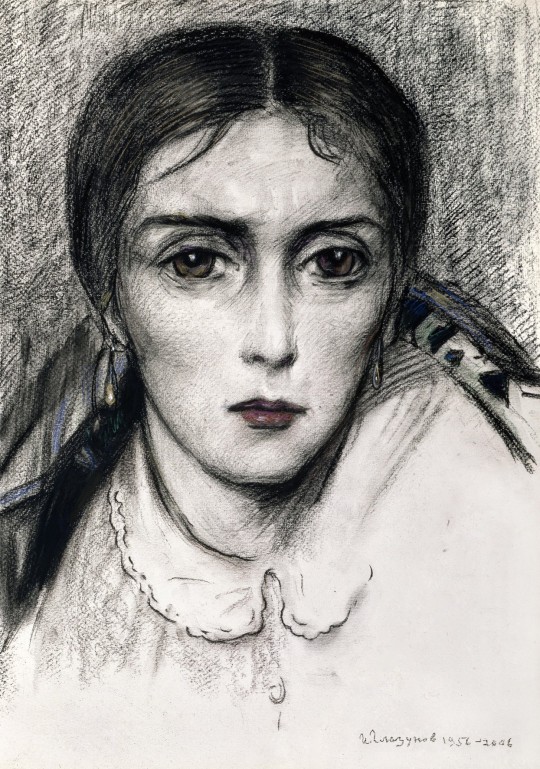
Nastasya Filippovna - Dostoevsky (The Idiot)
“I know that once when your sister Adelaida saw my portrait she said that such beauty could overthrow the world. But I have renounced the world. You think it strange that I should say so, for you saw me decked with lace and diamonds, in the company of drunkards and wastrels. Take no notice of that; I know that I have almost ceased to exist. God knows what it is dwelling within me now–it is not myself. I can see it every day in two dreadful eyes which are always looking at me, even when not present. These eyes are silent now, they say nothing; but I know their secret. His house is gloomy, and there is a secret in it. I am convinced that in some box he has a razor hidden, tied round with silk, just like the one that Moscow murderer had. This man also lived with his mother, and had a razor hidden away, tied round with white silk, and with this razor he intended to cut a throat.
All the while I was in their house I felt sure that somewhere beneath the floor there was hidden away some dreadful corpse, wrapped in oil-cloth, perhaps buried there by his father, who knows? Just as in the Moscow case. I could have shown you the very spot!
He is always silent, but I know well that he loves me so much that he must hate me. My wedding and yours are to be on the same day; so I have arranged with him. I have no secrets from him. I would kill him from very fright, but he will kill me first. He has just burst out laughing, and says that I am raving. He knows I am writing to you.”
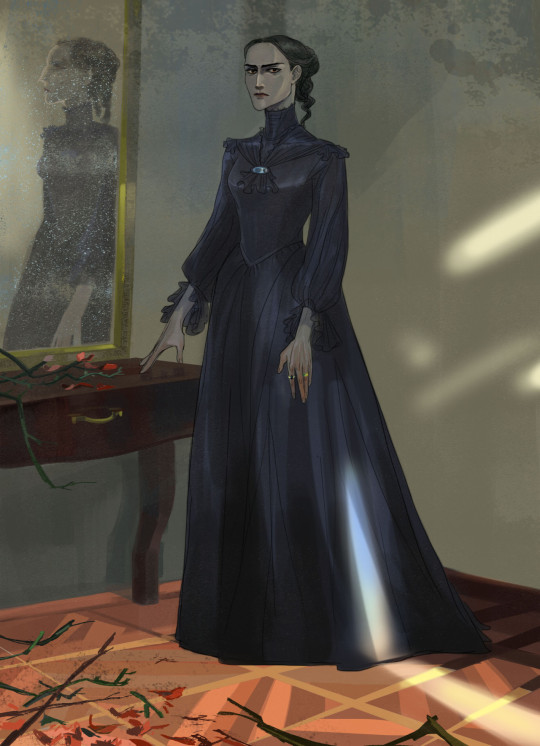
Dostoevsky’s Nastasya Filippovna from “THE IDIOT” (Snegovski _)
“but when he was two rooms distant from the drawing-room, where they all were, he stopped as though recalling something; went to the window, nearer the light, and began to examine the portrait in his hand.
He longed to solve the mystery of something in the face of Nastasia Philipovna, something which had struck him as he looked at the portrait for the first time; the impression had not left him. It was partly the fact of her marvellous beauty that struck him, and partly something else. There was a suggestion of immense pride and disdain in the face almost of hatred, and at the same time something confiding and very full of simplicity. The contrast aroused a deep sympathy in his heart as he looked at the lovely face. The blinding loveliness of it was almost intolerable, this pale thin face with its flaming eyes; it was a strange beauty.
The prince gazed at it for a minute or two, then glanced around him, and hurriedly raised the portrait to his lips. When, a minute after, he reached the drawing-room door, his face was quite composed.
…
Mrs. Epanchin examined the portrait of Nastasia Philipovna for some little while, holding it critically at arm’s length.
“Yes, she is pretty,” she said at last, “even very pretty. I have seen her twice, but only at a distance. So you admire this kind of beauty, do you?” she asked the prince, suddenly.
“Yes, I do—this kind.”
“Do you mean especially this kind?”
“Yes, especially this kind.”
“Why?”
“There is much suffering in this face,” murmured the prince, more as though talking to himself than answering the question.
“I think you are wandering a little, prince,” Mrs. Epanchin decided, after a lengthened survey of his face; and she tossed the portrait on to the table, haughtily.
Alexandra took it, and Adelaida came up, and both the girls examined the photograph. Just then Aglaya entered the room.
“What a power!” cried Adelaida suddenly, as she earnestly examined the portrait over her sister’s shoulder.
“Whom? What power?” asked her mother, crossly.
“Such beauty is real power,” said Adelaida. “With such beauty as that one might overthrow the world.” She returned to her easel thoughtfully.
Aglaya merely glanced at the portrait—frowned, and put out her underlip; then went and sat down on the sofa with folded hands.”
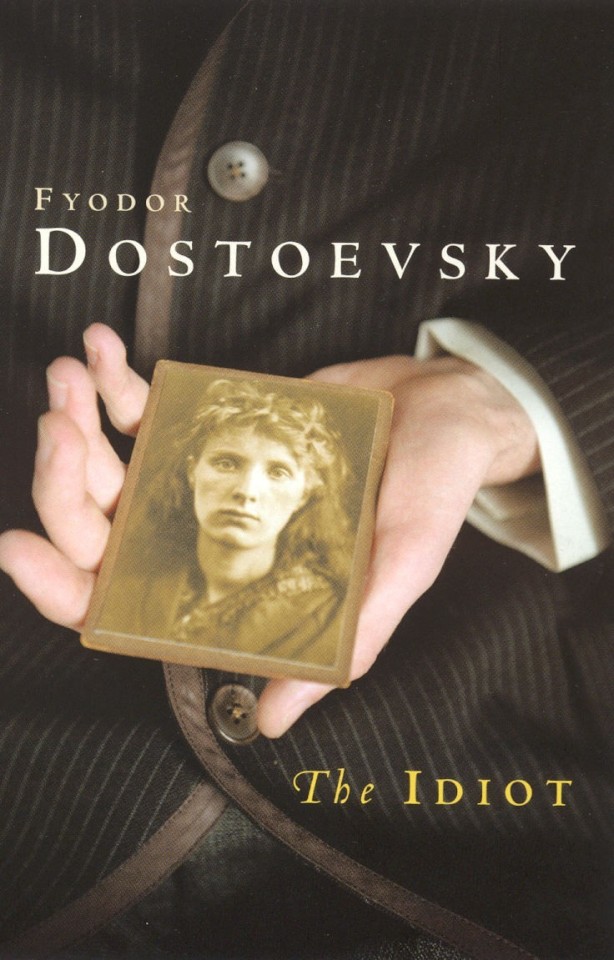
“The prince declares, upon marrying Nastasya Filippovna, that it is better to resurrect a woman than to perform the actions of Alexander of Macedonia.”
“The prince. Essential social conviction: the economic doctrine of the uselessness of individual good actions is absurd. On the contrary, everything is based on individual action.”
Dostoevsky, The Idiot’s Notebooks
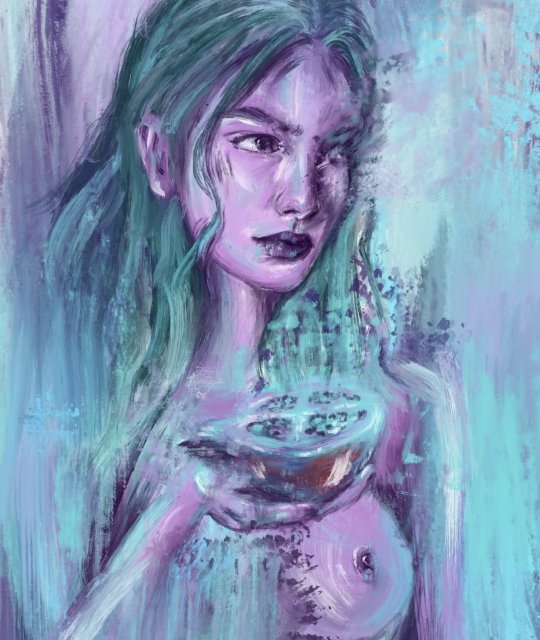
Photo via X/Twitter
“All we Karamazovs are such insects, and, angel as you are, that insect lives in you, too, and will stir up a tempest in your blood. Tempests, because sensual lust is a tempest—worse than a tempest! Beauty is a terrible and awful thing! It is terrible because it has not been fathomed and never can be fathomed, for God sets us nothing but riddles. Here the boundaries meet and all contradictions exist side by side. I am not a cultivated man, brother, but I’ve thought a lot about this. It’s terrible what mysteries there are! Too many riddles weigh men down on earth. We must solve them as we can, and try to keep a dry skin in the water. Beauty!
… Yes, man is broad, too broad, indeed. I’d have him narrower. The devil only knows what to make of it! What to the mind is shameful is beauty and nothing else to the heart. Is there beauty in Sodom? Believe me, that for the immense mass of mankind beauty is found in Sodom. Did you know that secret? The awful thing is that beauty is mysterious as well as terrible. God and the devil are fighting there and the battlefield is the heart of man. But a man always talks of his own ache.”
The Brothers Karamazov - Dostoevsky
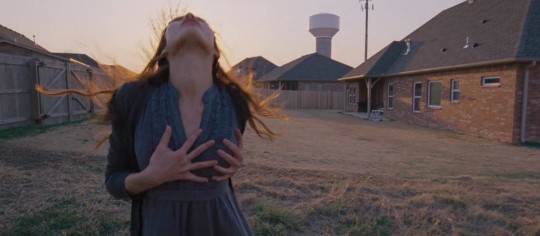
Marcel Proust: “Well, then, this novel beauty remains identical in all Dostoevsky’s works, the Dostoevsky woman (as distinctive as a Rembrandt woman) with her mysterious face, whose engaging beauty changes abruptly, as though her apparent good nature had been but make-believe, to a terrible insolence (although at heart it seems that she is more good than bad), is she not always the same, whether it be Nastasia Philipovna writing love letters to Aglaé and telling her that she hates her, or in a visit which is wholly identical with this — as also with that in which Nastasia Philipovna insults Vania’s family — Grouchenka, as charming in Katherina Ivanovna’s house as the other had supposed her to be terrible, then suddenly revealing her malevolence by insulting Katherina Ivanovna (although Grouchenka is good at heart); Grouchenka, Nastasia, figures as original, as mysterious not merely as Carpaccio’s courtesans but as Rembrandt’s Bathsheba.”
“This radiant, dual face, with sudden bursts of pride that make the woman appear other than she is (‘You are not such,’ Muichkine says to Nastasia in the visit to Gania’s parents, and Alyosha could say it to Grushenka in the visit to Katherina Ivanovna).”
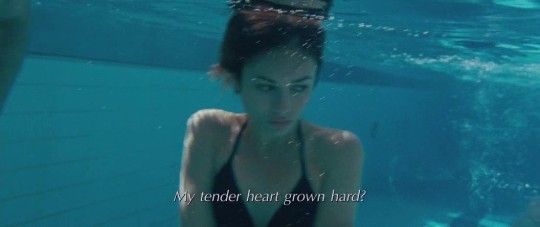
Photo: Olga Kurylenko: Marina, To the Wonder, Terrence Malick
“Terrence Malick recommended that Olga Kurylenko read The Idiot with a particular eye on two characters: the young and prideful Aglaya Yepanchin, and the fallen, tragic Nastassya Filippovna.”
Olga Kurylenko: “He wanted me to combine their influences — the romantic and innocent side, with the insolent and daring side. ‘For some reason, you only ever see that combination in Russian characters,’ he said to me.”
“Anna Karenina, The Brothers Karamazov, and The Idiot: Those books were, in a way, his script,” Olga Kurylenko says”.
- BEHIND THE SCENES: https://www.vulture.com/2013/04/how-terrence-malick-wrote-filmed-edited-to-the-wonder.html
…
“In To the Wonder (Terrence Malick), Marina (Olga Kurylenko) has a predisposition to melancholy,” Kurylenko says. “She’s a very unstable woman. She’s suffering. So when she meets a man, she sees him as the ending of all her suffering. But it’s just an illusion.”
To prepare, Terrence Malick directed the actress to the bricks of Russian literature – Anna Karenina (Leo Tolstoy), The Brothers Karamazov, and The Idiot (Dostoevsky).
Olga Kurylenko: “I didn’t even need the script after that. Those were my script. I built the character as a combination of the different female characters in those books.”
https://www.rollingstone.com/tv-movies/tv-movie-news/olga-kurylenko-talks-russian-literature-and-terrence-malick-181787/
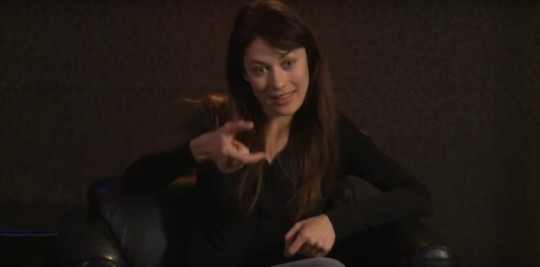
"Terrence Malick asked me to reread Anna Karenina, The Brothers Karamazov and The Idiot. All the three of them are that thick!"
Olga Kurylenko, 'To The Wonder’, Terrence Malick
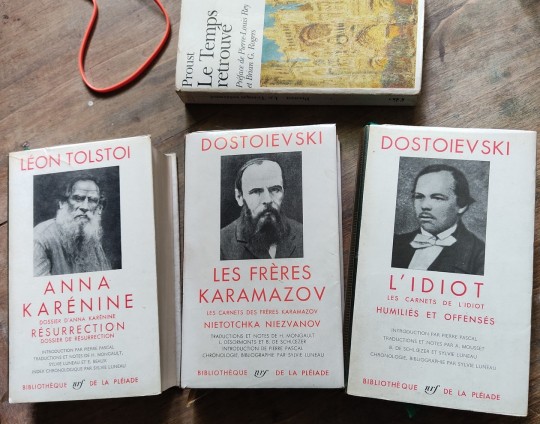
“Because life is not a thin book. It is terribly long, and tangled, and dense. Tolstoy didn’t even want to stop War and Peace. Two epilogues, eight new chapters… it was like Time itself in motion. And Dostoevsky, writing these gigantic books precisely because he always wants to start reality anew.”
George Steiner, translated from French
#art#heroine#artist#dostoevsky#terrence malick#literature#marcel proust#dostoyevski#novel#portrait#goddess#cinema#proust#girl power#dostoevksy#beauty#malick#olga kurylenko#nastasya filippovna#fyodor dostoevsky#woman#fyodor dostoyevsky#the idiot
13 notes
·
View notes
Photo


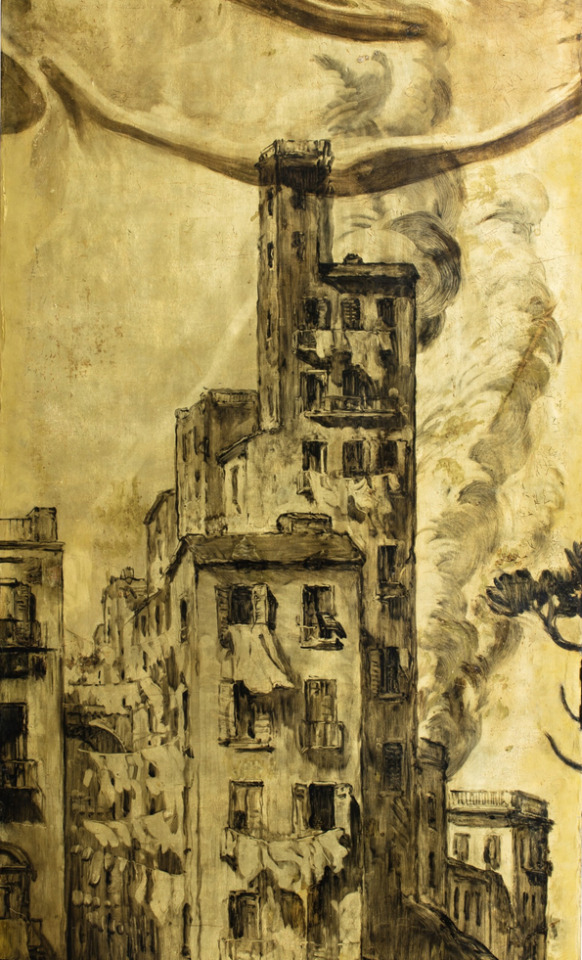

José María Sert (1874-1945)
'Vision de Naples'
An eleven-leaf screen, circa 1923
Giltwood and black glaze; decorated with scenes against the Bay of Naples, 390 x 800 cm.
Sotheby’s
Catalogue Note:
José Maria Sert (1874-1945), the "Tiepolo of the Ritz", is part of the closed circle of the great society artists of the 20th century. He married the famous Misia Godebska whom Forain introduced to him, better known as Misia Sert, a central figure in artistic and literary Paris at the end of the 19th century and between the wars. Muse successively of Mallarmé, Vuillard, Renoir, Proust, Diaghilev and Cocteau, Misia was also the confidante of Gabrielle Chanel for whom Sert created this screen.
Undermined by the Parisian avant-garde, he is part of a primarily decorative painting tradition influenced by Goya, Manet and of course Tiepolo. In his studio in the rue Barbet de Jouy, Sert created a grandiose decor in the image of his painting, mixing baroque furniture, gilded bronzes, crystals and Coromandel screens. Gabrielle Chanel retained this lesson in decoration and applied it in all her Parisian residences thereafter, as her apartment on rue Cambon still testifies. Sert held a salon there where he received the entire Café Society of the time, who commissioned him for multiple projects. Specializing in very large wall decorations and screens, he went from polychrome painting to monochrome painting on a gold background, which better suited his exuberant style. He received important commissions at the turn of the century throughout Europe and more particularly in England (between 1914 and 1915 for Lady Ripon at Combe Court and Sir Philip Sassoon at Lympe and between 1918 and 1919 for Sir Saxton Noble at Wretham Hall). He received his first commission in the United States in 1924 for Mr. Joshua Cosden's music room in Palm Beach. An exhibition in New York at the Wildenstein Galleries completed his launch across the Atlantic. He then undertook grandiose projects such as an entire room at the Waldorf Astoria in New York in 1930, and the entrance main building of Rockefeller Center, built in 1933.
"Art loses the last representative of great painting", wrote Paul Claudel in Le Figaro on 14 December 1945, on the death of his friend José María Sert. The monumentality of his work and the power of his personality made Sert an artist unanimously admired in his time.
#josé maría sert#art history#interior design#tiepolo#goya#furniture design#gold#trompe l'œil#naples#italy#paris#1920s#gabrielle chanel
26 notes
·
View notes
Text
Mr. Beast has given 50 gay french dudes a Madeleine de Proust
33 notes
·
View notes
Text
"Please," said Tiffany, "can we get some sleep? My father always says that things will look better in the morning."
There was a pause. "On reflection," Mrs. Proust said, "I think your father will turn out to be wrong."
Terry Pratchett, I Shall Wear Midnight
#tiffany aching#mrs. proust#i shall wear midnight#discworld#terry pratchett#witches#wise sayings#parents#sleep#not true#on reflection#better in the morning
119 notes
·
View notes
Text
Erzulie Gogol vs. Eunice Proust
Erzulie Gogol
Mrs. Gogol is a voodoo witch. She's also a great cook. She lives in the swamp just outside Genua, together with Baron Saturday. She smokes a pipe. Her cottage can move about on duck-like feet over land or water. Mrs. Gogol's Genuan style of magic, besides the entrancing cooking, includes the raising of gods and zombies. She is adept at scrying and headology. The cooking itself may be used as a means of predicting the future, by the bubbles and patterns of ingredients. Her familiar, Legba, is a black cock who can even daunt Nanny Ogg's fearsome cat, Greebo.
Eunice Proust
Mrs. Proust is the Ankh-Morpork witch and owner of the Boffo Joke Shop, where many of the mountain witches get their supplies. She is vastly ugly, with a hooked nose and many warts and blemishes. She bases the masks she creates at the shop on her own face. Mrs Proust is somewhat more blatant with her use of power than Tiffany or the mountain witches, including enchanting a window so that it throws stones back at people who throw stones at it. This shows she is a very talented witch and one with different beliefs from witches such as Granny Weatherwax. Mrs. Proust also provides discreet medical services for Watchmen who are too embarrassed to go to Igor and don't want their mother to know. She also has an Arrangement with Captain Angua von Überwald with regard to treating her hardpad.
13 notes
·
View notes
Text
100 Books to Read Before I Die: Quest Order
The Lord Of The Rings by J. R. R. Tolkien
In Search of Lost Time by Marcel Proust
The Great Gatsby by F. Scott Fitzgerald
A Wrinkle in Time by Madeleine L’Engle
Jane Eyre by Charlotte Brontë
Pride and Prejudice by Jane Austen
Frankenstein by Mary Shelley
The Good Soldier by Ford Madox Ford
Under The Net by Iris Murdoch
American Pastoral by Philip Roth
The Unbearable Lightness of Being by Milan Kundera
Animal Farm by George Orwell
Housekeeping by Marilynne Robinson
Anna Karenina by Leo Tolstoy
Atonement by Ian McEwan
Crime And Punishment by Fyodor Dostoyevsky
The Grapes Of Wrath by John Steinbeck
Midnight’s Children by Salman Rushdie
Lucky Jim by Kingsley Amis
Slaughterhouse-Five by Kurt Vonnegut
The Sun Also Rises by Ernest Hemingway
Invisible Man by Ralph Ellison
A Passage to India by EM Forster
Of Human Bondage by W. Somerset Maugham
The Prime of Miss Jean Brodie by Muriel Spark
The Amazing Adventures of Kavalier and Clay by Michael Chabon
If on a Winter’s Night a Traveller by Italo Calvino
The Hitchhiker’s Guide to the Galaxy by Douglas Adams
1984 by George Orwell
White Noise by Don DeLillo
The Count of Monte Cristo by Alexandre Dumas
The Sound and the Fury by William Faulkner
The Stranger by Albert Camus
Lolita by Vladimir Nabokov
Oscar And Lucinda by Peter Carey
The Wind-Up Bird Chronicle by Haruki Murakami
Gulliver’s Travels by Jonathan Swift
Brave New World by Aldous Huxley
As I Lay Dying by William Faulkner
To Kill A Mockingbird by Harper Lee
Lord of the Flies by William Golding
The Portrait of a Lady by Henry James
The Call of the Wild by Jack London
Pale Fire by Vladimir Nabokov
Beloved by Toni Morrison
Tinker Tailor Soldier Spy by John Le Carré
Austerlitz by W. G. Sebald
The Scarlet Letter by Nathaniel Hawthorne
Brideshead Revisited by Evelyn Waugh
Tropic of Cancer by Henry Miller
The Age of Innocence by Edith Wharton
Mrs. Dalloway by Virginia Woolf
The Heart Is a Lonely Hunter by Carson McCullers
The Phantom Tollbooth by Norton Juster
Ulysses by James Joyce
Scoop by Evelyn Waugh
Haroun and the Sea of Stories by Salman Rushdie
Things Fall Apart by Chinua Achebe
Middlemarch by George Eliot
Are You There, God? It’s me, Margaret by Judy Blume
Clarissa by Samuel Richardson
Moby-Dick by Herman Melville
The Handmaid’s Tale by Margaret Atwood
Herzog by Saul Bellow
The Brief Wondrous Life of Oscar Wao by Junot Diaz
Wuthering Heights by Emily Brontë
Don Quixote by Miguel De Cervantes
A Bend in the River by V. S. Naipaul
A Dance to The Music of Time by Anthony Powell
The Strange Case of Dr Jekyll and Mr Hyde by Robert Louis Stevenson
Go Tell It On The Mountain by James Baldwin
Wide Sargasso Sea by Jean Rhys
Catch-22 by Joseph Heller
The Rainbow by D. H. Lawrence
Song of Solomon by Toni Morrison
I, Claudius by Robert Graves
Nostromo by Joseph Conrad
The Tin Drum by Gunter Grass
Madame Bovary by Gustave Flaubert
The Catcher in the Rye by JD Salinger
Charlotte’s Web by E. B. White
Tom Jones by Henry Fielding
His Dark Materials by Philip Pullman
Alice’s Adventures In Wonderland by Lewis Carroll
Little Women by Louisa M Alcott
Great Expectations by Charles Dickens
Portnoy’s Complaint by Philip Roth
Watchmen by Alan Moore
One Hundred Years of Solitude by Gabriel García Márquez
Robinson Crusoe by Daniel Defoe
Tristram Shandy by Laurence Sterne
On the Road by Jack Kerouac
The Big Sleep by Raymond Chandler
The Wind in the Willows by Kenneth Grahame
To the Lighthouse by Virginia Woolf
The Corrections by Jonathan Franzen
The Trial by Franz Kafka
Their Eyes Were Watching God by Zora Neale Hurston
Money by Martin Amis
David Copperfield by Charles Dickens
7 notes
·
View notes
Text
there are reasons why it's recommended not to write like a 19th century aesthete today, especially when venturing into the traditional publishing market
but I want to read more contemporary books written like the classics. I want the formal outdated words, the meandering, the circumlocution, the melodrama... but with today's sensibilities and values and cultural norms
as much as I like the classics and enjoy returning to them again and again, I want to read about an insufferable trans man whining about a 21st century state of mal du siècle, and suddenly remember I'm not reading oscar wilde or proust when the vile mr jeff bezos gets mentioned
12 notes
·
View notes
Text
100 livres à avoir lu dans sa vie (entre autres):
1984, George Orwell ✅
A la croisée des mondes, Philip Pullman
Agnès Grey, Agnès Bronte ✅
Alice au Pays des merveilles, Lewis Carroll ✅
Angélique marquise des anges, Anne Golon
Anna Karenine, Léon Tolstoï
A Rebours, Joris-Karl Huysmans
Au bonheur des dames, Émile Zola
Avec vue sur l'Arno, E.M Forster
Autant en emporte le vent, Margaret Mitchell
Barry Lyndon, William Makepeace Thackeray
Belle du Seigneur, Albert Cohen
Blonde, Joyce Carol Oates
Bonjour tristesse, Françoise Sagan ✅
Cent ans de solitude, Gabriel Garcia Marquez
Charlie et la chocolaterie, Roald Dahl ✅
Chéri, Colette
Crime et Châtiment, Féodor Dostoïevski
De grandes espérances, Charles Dickens
Des fleurs pour Algernon, Daniel Keyes
Des souris et des hommes, John Steinbeck ✅
Dix petits nègres, Agatha Christie ✅
Docteur Jekyll et Mister Hyde, Robert Louis Stevenson ✅
Don Quichotte, Miguel Cervantés
Dracula, Bram Stocker ✅
Du côté de chez Swann, Marcel Proust
Dune, Frank Herbert ✅
Fahrenheit 451, Ray Bradbury ✅
Fondation, Isaac Asimov
Frankenstein, Mary Shelley ✅
Gatsby le magnifique, Francis Scott Fitzgerald ✅
Harry Potter à l'école des sorciers, J.K Rowling
Home, Toni Morrison
Jane Eyre, Charlotte Bronte
Kafka sur le rivage, Haruki Murakami
L'adieu aux armes, Ernest Hemingway ✅
L'affaire Jane Eyre, Jasper Fforde
L'appel de la forêt, Jack London ✅
L'attrape-cœur, J. D. Salinger ✅
L'écume des jours, Boris Vian
L'étranger, Albert Camus ✅
L'insoutenable légèreté de l'être, Milan Kundera
La condition humaine, André Malraux
La dame aux camélias, Alexandre Dumas Fils
La dame en blanc, Wilkie Collins
La gloire de mon père, Marcel Pagnol
La ligne verte, Stephen King ✅
La nuit des temps, René Barjavel
La Princesse de Clèves, Mme de La Fayette ✅
La Route, Cormac McCarthy ✅
Le chien des Baskerville, Arthur Conan Doyle
Le cœur cousu, Carole Martinez
Le comte de Monte-Cristo, Alexandre Dumas : tome 1 et 2
Le dernier jour d'un condamné, Victor Hugo ✅
Le fantôme de l'opéra, Gaston Leroux
Le lièvre de Vaatanen, Arto Paasilinna
Le maître et Marguerite, Mikhaïl Boulgakov
Le meilleur des mondes, Aldous Huxley
Le nom de la rose, Umberto Eco
Le parfum, Patrick Süskind
Le portrait de Dorian Gray, Oscar Wilde ✅
Le Petit Prince, Antoine de Saint-Exupery ✅
Le père Goriot, Honoré de Balzac ✅
Le prophète, Khalil Gibran ✅
Le rapport de Brodeck, Philippe Claudel
Le rouge et le noir, Stendhal ✅
Le Seigneur des anneaux, J.R Tolkien ✅
Le temps de l'innocence, Edith Wharton
Le vieux qui lisait des romans d'amour, Luis Sepulveda ✅
Les Chroniques de Narnia, CS Lewis
Les Hauts de Hurle-Vent, Emily Brontë
Les liaisons dangereuses, Choderlos de Laclos ✅
Les Malaussène, Daniel Pennac ✅
Les mémoires d'une jeune fille rangée, Simone de
Beauvoir
Les mystères d'Udolfo, Ann Radcliff
Les piliers de la Terre, Ken Follett : tome 1
Les quatre filles du Docteur March, Louisa May
Alcott
Les racines du ciel, Romain Gary
Lettre d'une inconnue, Stefan Zweig ✅
Madame Bovary, Gustave Flaubert ✅
Millenium, Larson Stieg ✅
Miss Charity, Marie-Aude Murail
Mrs Dalloway, Virginia Woolf
Ne tirez pas sur l'oiseau moqueur, Harper Lee ✅
Nord et Sud, Elisabeth Gaskell
Orgueil et Préjugés, Jane Austen
Pastorale américaine, Philip Roth
Peter Pan, James Matthew Barrie
Pilgrim, Timothy Findley
Rebecca, Daphne Du Maurier
Robinson Crusoé, Daniel Defoe ✅
Rouge Brésil, Jean Christophe Ruffin
Sa majesté des mouches, William Goldwin ✅
Tess d'Uberville, Thomas Hardy
Tous les matins du monde, Pascal Quignard
Un roi sans divertissement, Jean Giono
Une prière pour Owen, John Irving
Une Vie, Guy de Maupassant
Vent d'est, vent d'ouest, Pearl Buck
Voyage au bout de la nuit, Louis-Ferdinand Céline ✅
Total : 37/100
21 notes
·
View notes
Text
There are moments that feel like taken from books:
Like waiting alone for a tram late at night in post soviet city makes you feel like you're in Master and Margarita
Having a good cup of tea is just like Proust and his Search for the lost time
Slow sunny summer afternoon feels like one of Shakespeare's sonnets
The blooming spring is like Jane Austen novel
A rainy autumn afternoon reminds me of Keats
Running errands around the town is sometimes like Mrs. Dalloway
Chilly winter day transports you in your favourite fairytale all of sudden
And these moments are perfect. I cherish them.
2 notes
·
View notes
Note
7, 8, 9, and 22 for the book ask thing!
ur least fav book trope?
"it was all a dream" and amnesia are tied for this. no one ever does anything interesting with these two. amnesia is such a cheap move in thrillers too. also have the surprise killer from left field in thrillers and mysteries. stop with that!!!
the best protagonist u have ever seen in a book and why?
amy dunne and nick dunne in gone girl, tied. they're horrible. the way they reflect on the other and think of themselves. amazing writing. amazing dissection of how we storytell about people we hate/love. there's so much to pick apart in that book and how both of them obsess over rules and roles and presentability. also not to be a sicko but where's hsr aus of gone girl?!?!? come on now.
if u were stuck on an island and could only have three books w u what would they be? (series would be counted as one cuz as i said so)
minmaxing the fuck outta this one
the locked tomb by tamsyn muir, because there's so much to digest and re-read. proust's in search of time lost, because at least i would have time to read it. jonathan strange & mr norrell by susanna clarke because i really liked piranesi but i'm daunted by that one.
a book that u hated at first but now love it?
i re-read books a lot but more often i end up disliking them on the second go if my opinion changes, so hmm. it did take me a few tries to get anywhere with the locked tomb series. i hated my first try at it. i still think the first quarter of gideon the ninth is a bit janky.
3 notes
·
View notes